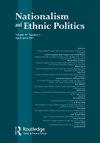“Why Do We Need a World without Russia in It?” Discursive Justifications of the Russian Invasion of Ukraine in Russia and Germany
IF 0.7
Q3 ETHNIC STUDIES
引用次数: 0
Abstract
Abstract Russia’s full-scale invasion of Ukraine, which started on February 24, 2022, has marked a turning point in Russian-Western relations. While liberal democratic societies’ unanimous condemnation of that invasion was followed by unprecedented sanctions and a rupture of diplomatic and economic relations with Russia, some Western social and political actors supported, to some extent, the Russian rhetoric regarding the invasion of Ukraine. Consequentially, this paper not only reveals that Russian state discourses aimed to justify the invasion, it also identifies the selective dissemination of Russian state discourses by the AfD in Germany. Moreover, it compares the antagonistic discursive dynamics in the authoritarian pseudo-civil sphere and the similar discourses of the radical right in the democratic civil sphere, and examine their reception in Russia and Germany. Drawing on Multilayered Narrative Analysis, which relies on a combination of cultural sociological Civil Sphere Theory (CST) and mnemonic figurations developed in the historical sociology of Bernhard Giesen, this paper first describes the Russian state discourses intended to sacralize the Russian invasion of Ukraine. It then examines to what extent the populist radical right disseminated these in Germany, before analyzing and comparing the symbolic influence of such discourses in the Russian pseudo-civil and German civil spheres.“为什么我们需要一个没有俄罗斯的世界?”俄罗斯入侵乌克兰在俄罗斯和德国的话语正当性
俄罗斯从2022年2月24日开始全面入侵乌克兰,标志着俄罗斯与西方关系的转折点。尽管自由民主社会一致谴责那次入侵,随后又对俄罗斯实施了前所未有的制裁,断绝了与俄罗斯的外交和经济关系,但一些西方社会和政治行为者在某种程度上支持俄罗斯关于入侵乌克兰的言论。因此,本文不仅揭示了俄罗斯国家话语旨在为入侵辩护,还确定了德国另类选择党在德国选择性传播俄罗斯国家话语。此外,它比较了专制伪公民领域的对抗性话语动态和民主公民领域激进右翼的类似话语,并考察了它们在俄罗斯和德国的接受情况。本文首先运用文化社会学的公民圈理论(CST)和伯恩哈德·吉森(Bernhard Giesen)的历史社会学的助记比喻相结合的多层次叙事分析方法,描述了旨在将俄罗斯入侵乌克兰神圣化的俄罗斯国家话语。然后,在分析和比较这些话语在俄罗斯伪公民和德国公民领域的象征性影响之前,研究民粹主义激进右翼在德国传播这些话语的程度。
本文章由计算机程序翻译,如有差异,请以英文原文为准。
求助全文
约1分钟内获得全文
求助全文
来源期刊

Nationalism and Ethnic Politics
ETHNIC STUDIES-
CiteScore
1.30
自引率
0.00%
发文量
30
期刊介绍:
Nationalism & Ethnic Politics explores the varied political aspects of nationalism and ethnicity in order to develop more constructive inter-group relations. The journal publishes case studies and comparative and theoretical analyses. It deals with pluralism, ethno-nationalism, irredentism, separatism, and related phenomena, and examines processes and theories of ethnic identity formation, mobilization, conflict and accommodation in the context of political development and "nation-building". The journal compares and contrasts state and community claims, and deal with such factors as citizenship, race, religion, economic development, immigration, language, and the international environment.
 求助内容:
求助内容: 应助结果提醒方式:
应助结果提醒方式:


